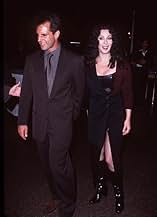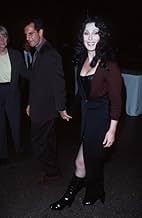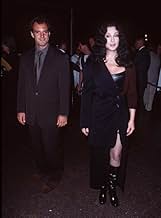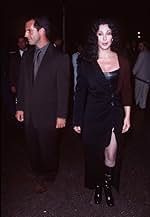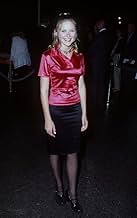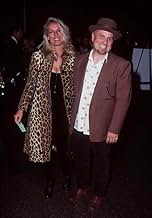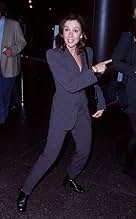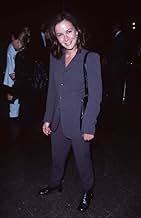IMDb रेटिंग
6.9/10
5.4 हज़ार
आपकी रेटिंग
अपनी भाषा में प्लॉट जोड़ेंThe movie examines the abortion issue through three stories set in different eras: 1952, 1974 and 1996.The movie examines the abortion issue through three stories set in different eras: 1952, 1974 and 1996.The movie examines the abortion issue through three stories set in different eras: 1952, 1974 and 1996.
- 4 प्राइमटाइम एमी के लिए नामांकित
- 4 जीत और कुल 15 नामांकन
Bob Shuttleworth
- Hospital Visitor (segment "1952")
- (as Bob Shuttlesworth)
फ़ीचर्ड समीक्षाएं
Demi Moore, Sissy Spacek and Anne Heche play three very different women from different eras (the 1950's, 1970's and 1990's respectively) who are each confronted with the same dilemma. They're pregnant, and struggling with whether or not to end the pregnancy, with each story being set against the value system of the day. The stories are unrelated in any other way, but together they represent an interesting evolution of thoughts around the abortion issue.
Moore's performance is probably the one that brings forth the greatest feelings of sympathy from the viewer. She's a nurse and a young widow, alone and lonely except for the connection to her deceased husband's family, who has to find a way to deal with a pregnancy that was unplanned and the result of a one-time "fling" with her brother in law. Abortion is illegal, she has to avoid shaming her "family," and she can't just disappear for nine months to give birth because she has a job and little money. In the end she finds a shady abortion provider who does the deed on her kitchen table, and leaves her in a desperate condition - her fate remaining a mystery. This was the most powerful of the stories. Heche's character has an affair with an older, married man who wants nothing to do with the responsibility. She chooses abortion after a lot of soul-searching, but while it's legal in the 90's she's confronted by pro-life protesters at the door of the clinic who do cause her to think twice about the decision, although she ultimately goes ahead with it. With a best friend who's pro-life but supportive of her she goes falls into a scene of horror that seemed to me too expected and contrived. The soul-searching the character goes through, though, makes this a worthwhile vignette. The weakest of the three stories was probably that featuring Spacek. She's a mother of three in a happy marriage and re-starting her own education when she becomes pregnant again. This story revolves mostly around tensions within the family as all consider the potential impact of the pregnancy on their hopes and dreams. In the end, this pregnancy continues.
It was interesting to see the perspective on the issue from three very different generations.
Moore's performance is probably the one that brings forth the greatest feelings of sympathy from the viewer. She's a nurse and a young widow, alone and lonely except for the connection to her deceased husband's family, who has to find a way to deal with a pregnancy that was unplanned and the result of a one-time "fling" with her brother in law. Abortion is illegal, she has to avoid shaming her "family," and she can't just disappear for nine months to give birth because she has a job and little money. In the end she finds a shady abortion provider who does the deed on her kitchen table, and leaves her in a desperate condition - her fate remaining a mystery. This was the most powerful of the stories. Heche's character has an affair with an older, married man who wants nothing to do with the responsibility. She chooses abortion after a lot of soul-searching, but while it's legal in the 90's she's confronted by pro-life protesters at the door of the clinic who do cause her to think twice about the decision, although she ultimately goes ahead with it. With a best friend who's pro-life but supportive of her she goes falls into a scene of horror that seemed to me too expected and contrived. The soul-searching the character goes through, though, makes this a worthwhile vignette. The weakest of the three stories was probably that featuring Spacek. She's a mother of three in a happy marriage and re-starting her own education when she becomes pregnant again. This story revolves mostly around tensions within the family as all consider the potential impact of the pregnancy on their hopes and dreams. In the end, this pregnancy continues.
It was interesting to see the perspective on the issue from three very different generations.
I have just seen 'If These Walls Could Talk' for the first time, and I am completely in awe. This film should be mandatory viewing material for any person who thinks that abortion is an easy choice or that women faced with an unplanned pregnancy should have their right to choose taken away from them.
Sissy Spacek did a wonderful job portraying the most overlooked unplanned pregnancy demographic: the aging career mother who must choose whether or not to make the sacrifice of raising another child. In this story I truly appreciated the message that choosing to have a child is also pro-choice. Anne Heche's role in the final story was the most 'typical' of the three: the single college student who must struggle with her own moral and personal issues when making a choice about her pregnancy. While she portrayed the most common demographic of women who face an unplanned pregnancy, her role was beautifully and honestly acted. But the most riveting and heartbreaking of the three stories featured Demi Moore as a young widow who must make the hardest decision in her life-- to risk not only her career and reputation but the relationship of her in-laws who have taken her in as one of their own by carrying to term the baby of her dead husband's brother, or to risk her life by choosing what was once a barbaric and incredibly dangerous procedure due to the illegality of abortion. Her struggle is disturbing, and any woman who remembers the dark days before Roe v. Wade will feel her character's pain, fear, and especially her desperation. This story in particular showcases why keeping abortion safe and legal is so very necessary.
What struck me most about this film was not only the realism in all three situations, but how each one of the stories showed that "Pro-Choice" is not always "Pro-Abortion"; a fact that those of us who support a woman's right to chose will be all too glad to point out while those of the stauncher anti-choice fold may be a little slow to admit. The struggle that each woman faces in this film is unique, and while another reviewer mistakenly commented that each instance was merely 'cliché', I will argue that each instance was REAL. Rape and incest are not the causes for most unplanned pregnancies, and a great number of women who choose abortion are of legal age to do so. This film would have been 'cliché' if every actor had portrayed a low-income person of color, which is clearly unrealistic. And while violence against abortion providers isn't an every day occurrence, there are people in our society who wish that were the case-- and including this scene in the film shows us, in graphic detail, the hypocrisy of that opinion.
I was surprised that this film, especially the final story, didn't tackle other reproductive choice-related issues such as birth control. However, I was extremely pleased with how the final story educated viewers on the realities of the abortion procedure (mandatory counseling and all)-- a reality which couldn't be further from the horrific depictions offered up by many in the anti-choice camp. Speaking of which: I was grateful for this film showing that not all people who oppose abortion are stereotypical, out of control lunatics, but that the most radical in this faction tend to be, ironically, male. And one comment made by a character regarding adoption truly hit home for me as I once worked in a residential facility for abandoned and abused children that was, like so many others in this country, bursting at the seams: "The last time I checked, there wasn't a shortage of little black babies".
This film needs to be aired during prime time and piped into the Bush White House, if for no other reason than to show that abortion is not a black and white issue, that the argument surrounding it cannot be settled through protest, violence or prohibition, and that restricting a woman's legal right to reproductive choice will only complicate matters further but will not be an end to abortion. Anyone who has ever been faced with an unplanned pregnancy will agree, and anyone who hasn't will learn that their opinion can be subject to change depending on their circumstances.
Sissy Spacek did a wonderful job portraying the most overlooked unplanned pregnancy demographic: the aging career mother who must choose whether or not to make the sacrifice of raising another child. In this story I truly appreciated the message that choosing to have a child is also pro-choice. Anne Heche's role in the final story was the most 'typical' of the three: the single college student who must struggle with her own moral and personal issues when making a choice about her pregnancy. While she portrayed the most common demographic of women who face an unplanned pregnancy, her role was beautifully and honestly acted. But the most riveting and heartbreaking of the three stories featured Demi Moore as a young widow who must make the hardest decision in her life-- to risk not only her career and reputation but the relationship of her in-laws who have taken her in as one of their own by carrying to term the baby of her dead husband's brother, or to risk her life by choosing what was once a barbaric and incredibly dangerous procedure due to the illegality of abortion. Her struggle is disturbing, and any woman who remembers the dark days before Roe v. Wade will feel her character's pain, fear, and especially her desperation. This story in particular showcases why keeping abortion safe and legal is so very necessary.
What struck me most about this film was not only the realism in all three situations, but how each one of the stories showed that "Pro-Choice" is not always "Pro-Abortion"; a fact that those of us who support a woman's right to chose will be all too glad to point out while those of the stauncher anti-choice fold may be a little slow to admit. The struggle that each woman faces in this film is unique, and while another reviewer mistakenly commented that each instance was merely 'cliché', I will argue that each instance was REAL. Rape and incest are not the causes for most unplanned pregnancies, and a great number of women who choose abortion are of legal age to do so. This film would have been 'cliché' if every actor had portrayed a low-income person of color, which is clearly unrealistic. And while violence against abortion providers isn't an every day occurrence, there are people in our society who wish that were the case-- and including this scene in the film shows us, in graphic detail, the hypocrisy of that opinion.
I was surprised that this film, especially the final story, didn't tackle other reproductive choice-related issues such as birth control. However, I was extremely pleased with how the final story educated viewers on the realities of the abortion procedure (mandatory counseling and all)-- a reality which couldn't be further from the horrific depictions offered up by many in the anti-choice camp. Speaking of which: I was grateful for this film showing that not all people who oppose abortion are stereotypical, out of control lunatics, but that the most radical in this faction tend to be, ironically, male. And one comment made by a character regarding adoption truly hit home for me as I once worked in a residential facility for abandoned and abused children that was, like so many others in this country, bursting at the seams: "The last time I checked, there wasn't a shortage of little black babies".
This film needs to be aired during prime time and piped into the Bush White House, if for no other reason than to show that abortion is not a black and white issue, that the argument surrounding it cannot be settled through protest, violence or prohibition, and that restricting a woman's legal right to reproductive choice will only complicate matters further but will not be an end to abortion. Anyone who has ever been faced with an unplanned pregnancy will agree, and anyone who hasn't will learn that their opinion can be subject to change depending on their circumstances.
Excellent film. Shows the realities of abortion and the trials and tribulations of the women who had to endure these situations. True to life and accurate depiction. Hopefully will help others to understand why some women choose to abort. It is not a decision made lightly or without conscious. And the film depicts how important it is for abortion to be legal. How even when it is illegal it still happens.
Very educational. A definite must see. Especially for those unsure of how they feel on this issue.
Excellent casting. Very emotional plots.
Very educational. A definite must see. Especially for those unsure of how they feel on this issue.
Excellent casting. Very emotional plots.
All three of these short films are good, but the first is outstanding, largely because Demi Moore, whose performances I've otherwise never particularly liked, is so excellent. The point that she and Savoca convey - powerfully - is the sheer isolation, 50 years ago, of women who faced unwanted pregnancies. Moore spends most of the film, it seems, sitting alone in an empty house. Otherwise, she's enduring the company of her late husband's family, who see her only as their boy's widow, not as a human being. It's a frightening story that exerts a very strong empathetic pull.
The dialog is spare; Savoca relies on Moore's face and body language to convey her terror, aloneness and feeling that things are closing in on her. There's very little "emoting" here, which makes Moore's character all the more forceful. The result is an exemplary piece of film acting.
Of course, how much do we need in the way of tears and histrionics when we can see Moore attempting the old knitting needle cure, and later dealing with the aftereffects of a ghastly kitchen-table operation? This country's abortion laws created - and maintain effectively, in many places - a sort of hell for pregnant women. Thanks to this film, we can really understand a bit of what it was - and is - like.
The dialog is spare; Savoca relies on Moore's face and body language to convey her terror, aloneness and feeling that things are closing in on her. There's very little "emoting" here, which makes Moore's character all the more forceful. The result is an exemplary piece of film acting.
Of course, how much do we need in the way of tears and histrionics when we can see Moore attempting the old knitting needle cure, and later dealing with the aftereffects of a ghastly kitchen-table operation? This country's abortion laws created - and maintain effectively, in many places - a sort of hell for pregnant women. Thanks to this film, we can really understand a bit of what it was - and is - like.
This film shows up as well now as I did when I first saw it in 1996 and was amazed. All those in the "demi moore can't act" camp should check out what she can do with the right material. She delivers an amazing performance in the first piece, giving those of us who dont remember a glimpse of the pre-Roe v Wade situation for women who found themselves in a less than desirable situation. Sissy Spacek is brilliant as ever in a lighter, though heartfelt and often ignored situation of a mom deciding whether one more child is what she wants. The final segment knocks me off my feet. Kudos to Cher for pulling together great actors and great stories.
क्या आपको पता है
- ट्रिवियाHolds the record as HBO's highest-rated original movie.
- गूफ़In the 1974 segment, one of the kids mentions wanting to watch The Partridge Family (1970), which at that time, aired on Saturday night. However, the kids had been to school that day so it was not a Saturday.
- भाव
Patti (segment "1996"): You get this abortion and I swear to you, you are on your own.
- इसके अलावा अन्य वर्जनThe UK video version was cut by 3 secs to reduce multiple gunshots during the hospital shooting scene.
- साउंडट्रैकCrazy
Written and Performed by Seal
टॉप पसंद
रेटिंग देने के लिए साइन-इन करें और वैयक्तिकृत सुझावों के लिए वॉचलिस्ट करें
विवरण
- चलने की अवधि
- 1 घं 37 मि(97 min)
- रंग
- ध्वनि मिश्रण
- पक्ष अनुपात
- 1.33 : 1
इस पेज में योगदान दें
किसी बदलाव का सुझाव दें या अनुपलब्ध कॉन्टेंट जोड़ें

